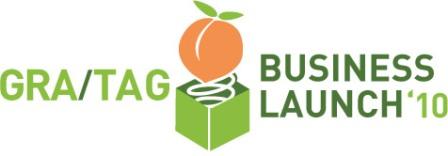Four companies to compete for over $250,000 in cash and services
 Last week, I was a judge in the the semi-finals of the 2010 GRA/TAG Business Launch Competition, with some very impressive startups presenting in the competition.
Last week, I was a judge in the the semi-finals of the 2010 GRA/TAG Business Launch Competition, with some very impressive startups presenting in the competition.
Today, the Technology Association of Georgia (TAG) announced the finalists for the 2010 GRA/TAG Business Launch Competition:
- Khu.sh, an intelligent music application company
- SolidFire, a cloud computing company
- Toomah, a company that automates the interviewing process
- Transaction Tree, a “green” company
The winner of the competition will receive $50,000 in cash and over $200,000 in business and professional services will be split among the finalists.
“We are very pleased with semi final judges’ selection of Khu.sh, SolidFire, Toomah and Transaction Tree as the finalists,” Tino Mantella, president of the Technology Association of Georgia said. “We are proud of the talent that has been displayed so far in the competition, and feel the selection further demonstrates the caliber and diversity of highly capable young companies in Atlanta.”
The winner of the competition will be announced during the June 2, 2010 awards ceremony held at IBM’s Hillside Building at 8:00 a.m. Registration for the awards ceremony is open to the public.
The TAG/GRA Business Launch Competition is designed to help a local startup technology company launch its business and has become one of largest competitions of its kind in the U.S. The competition is GRA/TAG’s way of rewarding high-tech entrepreneurship and assuring a deserving Georgia startup company is primed for success.
The initial applications were screened by experts at the Atlanta Technology Development Center (ATDC), with the most promising applicants assigned a mentor from the entrepreneurial community.
The semi finalist companies presented over a three day period last week to leaders in the community including Don Addington, ORTEC; Mark Braunstein, Georgia Tech; Ed Croft, Croft & Bender; Aaron DeSouza, Grant Thornton LLP; David Eckoff, Revolutionary Ventures; Dave Gould, TechOperators; Sami Jajeh, Arketi Group; Paul Judge, Barracuda; Sig Mosley, Imlay Investments, Inc.; Gordon Rogers, Atlanta Technology Angels; Martin Tilson, Martin R. Tilson and Associates; and Judi Vitale, AcuityCFO to determine their eligibility to present to the panel of final judges which includes venture capitalists, entrepreneurs and seasoned executives.
The 2010 final judges panel includes: Tom Crotty, Managing Director, Battery Ventures Boston; Stephen Fleming, Vice Provost, Enterprise Innovation Institute, Georgia Institute of Technology; John Glushik, General Partner, Intersouth Partners; Boris Jerkunica, Chairman, Atlanta Silverbacks; Hooks K. Johnston,General Partner, Valhalla Partners; Mark Koulogeorge, Managing General Partner, MK Capital; Mark Morel, Chairman & CEO, Whoop, Inc.; Alan Taetle, General Partner, Noro Moseley Partners.
More information:
http://www.tagonline.org/businesslaunch.php
{ 3 comments… read them below or add one }
David,
can you provide insights please, what was the thinking process behind counting khu.sh as a meaningful business? The company could have a tag-line “Hey’ya, fart apps can poop now!” Meanwhile the other part of economy is financial troubles and the Deepwater-Horizons amuse the public.
@somedude, A bit about the process: there were 12 judges in the semi-finals, and the 4 companies selected for the finals were the consensus picks.
Re: your question: personally, I don’t think it is appropriate for judges to talk about the thinking process around any particular company, either those selected as finalists, or otherwise. However, each company that participated received feedback about their presentation in a follow up conversation with one of the judges.
I know that’s not the answer you’re looking for in terms of behind the scenes detail and context, but I hope you can respect my answer.
Some additional visibility into how the judging team evaluated companies, for those who like to know more:
After each company presentation, we rated each company, on a score of 1 to 5 (5 highest score) in the following categories: a) management; b) well-defined value proposition; c) unique technology products & services; d) market potential; e) competition; f) product strategy; g) risk factors; and h) financial projections.
At breaks, each judge put their set of scores on a master list on the wall, so we could compare scores across companies.
Finally, when all the presentations were completed on Friday, judges deliberated and decided which companies to select as finalists in the competition.